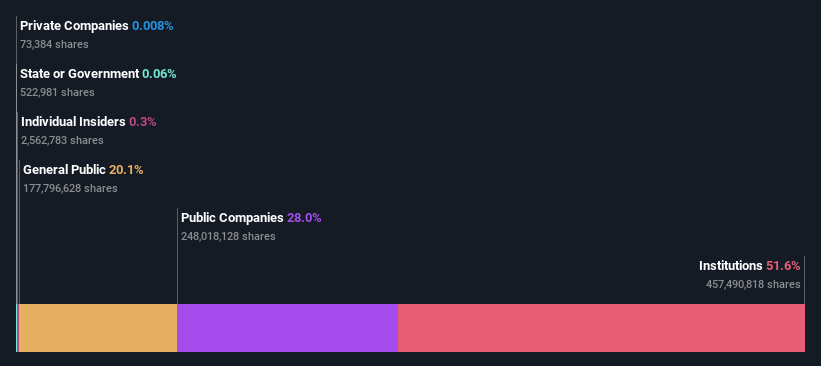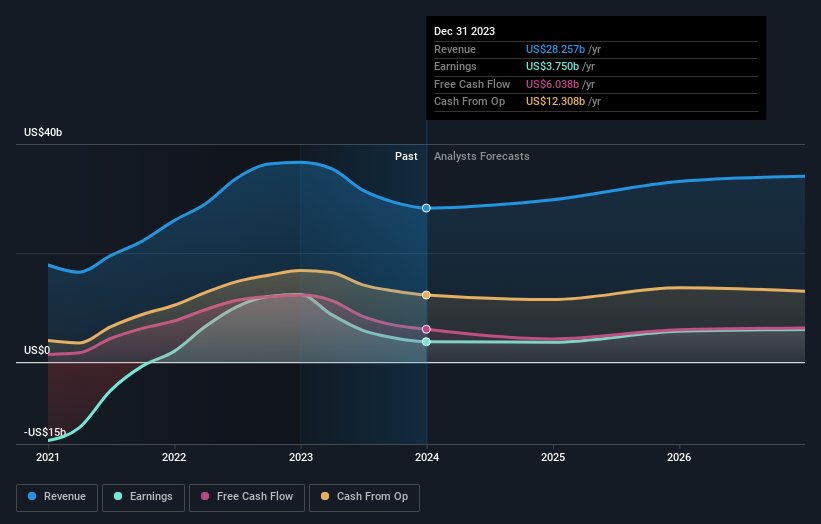With 52% ownership of the shares, Occidental Petroleum Corporation (NYSE:OXY) is heavily dominated by institutional owners
Key Insights
Given the large stake in the stock by institutions, Occidental Petroleum's stock price might be vulnerable to their trading decisions
The top 5 shareholders own 53% of the company
Using data from analyst forecasts alongside ownership research, one can better assess the future performance of a company
If you want to know who really controls Occidental Petroleum Corporation (NYSE:OXY), then you'll have to look at the makeup of its share registry. And the group that holds the biggest piece of the pie are institutions with 52% ownership. That is, the group stands to benefit the most if the stock rises (or lose the most if there is a downturn).
Since institutional have access to huge amounts of capital, their market moves tend to receive a lot of scrutiny by retail or individual investors. Hence, having a considerable amount of institutional money invested in a company is often regarded as a desirable trait.
Let's take a closer look to see what the different types of shareholders can tell us about Occidental Petroleum.
Check out our latest analysis for Occidental Petroleum
What Does The Institutional Ownership Tell Us About Occidental Petroleum?
Many institutions measure their performance against an index that approximates the local market. So they usually pay more attention to companies that are included in major indices.
We can see that Occidental Petroleum does have institutional investors; and they hold a good portion of the company's stock. This can indicate that the company has a certain degree of credibility in the investment community. However, it is best to be wary of relying on the supposed validation that comes with institutional investors. They too, get it wrong sometimes. If multiple institutions change their view on a stock at the same time, you could see the share price drop fast. It's therefore worth looking at Occidental Petroleum's earnings history below. Of course, the future is what really matters.
Institutional investors own over 50% of the company, so together than can probably strongly influence board decisions. We note that hedge funds don't have a meaningful investment in Occidental Petroleum. Berkshire Hathaway Inc. is currently the largest shareholder, with 28% of shares outstanding. In comparison, the second and third largest shareholders hold about 9.1% and 6.4% of the stock.
On looking further, we found that 53% of the shares are owned by the top 5 shareholders. In other words, these shareholders have a meaningful say in the decisions of the company.
Researching institutional ownership is a good way to gauge and filter a stock's expected performance. The same can be achieved by studying analyst sentiments. There are a reasonable number of analysts covering the stock, so it might be useful to find out their aggregate view on the future.
Insider Ownership Of Occidental Petroleum
The definition of an insider can differ slightly between different countries, but members of the board of directors always count. Company management run the business, but the CEO will answer to the board, even if he or she is a member of it.
I generally consider insider ownership to be a good thing. However, on some occasions it makes it more difficult for other shareholders to hold the board accountable for decisions.
Our most recent data indicates that insiders own less than 1% of Occidental Petroleum Corporation. As it is a large company, we'd only expect insiders to own a small percentage of it. But it's worth noting that they own US$171m worth of shares. It is good to see board members owning shares, but it might be worth checking if those insiders have been buying.
General Public Ownership
With a 20% ownership, the general public, mostly comprising of individual investors, have some degree of sway over Occidental Petroleum. While this group can't necessarily call the shots, it can certainly have a real influence on how the company is run.
Public Company Ownership
We can see that public companies hold 28% of the Occidental Petroleum shares on issue. We can't be certain but it is quite possible this is a strategic stake. The businesses may be similar, or work together.
Next Steps:
It's always worth thinking about the different groups who own shares in a company. But to understand Occidental Petroleum better, we need to consider many other factors. Be aware that Occidental Petroleum is showing 2 warning signs in our investment analysis , you should know about...
Ultimately the future is most important. You can access this free report on analyst forecasts for the company.
NB: Figures in this article are calculated using data from the last twelve months, which refer to the 12-month period ending on the last date of the month the financial statement is dated. This may not be consistent with full year annual report figures.
Have feedback on this article? Concerned about the content? Get in touch with us directly. Alternatively, email editorial-team (at) simplywallst.com.
This article by Simply Wall St is general in nature. We provide commentary based on historical data and analyst forecasts only using an unbiased methodology and our articles are not intended to be financial advice. It does not constitute a recommendation to buy or sell any stock, and does not take account of your objectives, or your financial situation. We aim to bring you long-term focused analysis driven by fundamental data. Note that our analysis may not factor in the latest price-sensitive company announcements or qualitative material. Simply Wall St has no position in any stocks mentioned.

 Yahoo Finance
Yahoo Finance 

